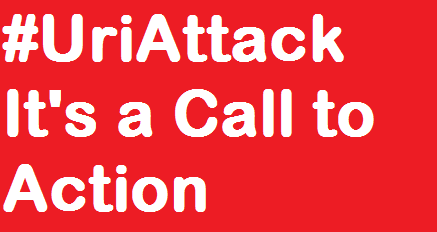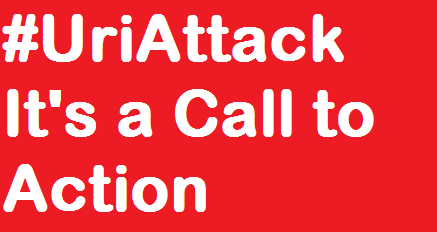
17 soldiers dead; 19 in critical condition – that’s what the best of our brave hearts faced early this morning in a deadly fidayeen attack on an Army Brigade location in Uri, J&K.
Early this morning, 4 fidayeen terrorists from across the border launched a grenade attack on the Army Brigade location, killing 17 soldiers of the Bihar Regiment and 2 soldiers of the Dogra Regiment. The injured are in critical condition and have been moved to the Army Base Hospital.
Read: Uri Attack – Effective retaliatory options before India
Following the attack, Home Minister Rajnath Singh cancelled his overseas tour and went into an emergency meeting at his residence with the NSA, Chief of RAW, Chief of IB, DG CRPF, DG BSF and the Home Secretary. Defence Minister, Parrikar and the Army Chief General, Dalbir Suhag have flown to the valley to assess the situation first hand.
The government is calling it a watershed moment and it is, most definitely. India has, for long, been stuck to its pacifist stance trying to remain in the good books of the international community. Well, with this attack, the gloves are off.
It’s War. Period.
For too long, India has patiently waited for the UN and countries like US to reign in Pakistan, but the international community has been maintaining a defensive stand nudging both countries to keep calm and continue talks. But that calm and pacifism has been immediately set aside by countries like France, Belgium, Spain, UK and Germany, the moment they came under direct terror attacks in the last 12 months.
When the US was attacked on 9/11, they took immediate unilateral action in another nation, in another continent at that, without waiting for international endorsement. It was in their self-interest.
Israel isn’t too far behind either. It has built its reputation for brutal counter action for each attack on its soil, or its citizens anywhere in the world, without worrying about international opinion, and raising the price for those who support these attacks.
For years, India has been fruitlessly discussing and talking with Pakistan as a responsible neighbour and it’s now time to drop this line and take direct unilateral action, as it deems best. India must be prepared to deal with the international community with the same denial that Pakistan has mastered over the years.
A country like China has not bothered about world opinion, despite losing its case in the South China Sea. And despite its supposed fight against terror, it has shielded Pakistan from any action against it at the UN.
It’s not that India hasn’t acted at all. When the Indian Army lost its soldiers in attack by Naga terrorists in the North East, we retaliated immediately by killing all perpetrators in cross border action. The problem is that the nation did not have the political guts to do the same with Pakistan and the latter knew it. Otherwise, today’s attack, and for that matter Pathankot, would not have happened.
Pushing the envelope
Look at the temerity with which the Pakistan Defence Minister has stated today that any Indian retaliatory action against the nation will invite a ‘nuclear’ response, it’s clear where Pakistan stands. This is not only irresponsible and dangerous, but also challenging India on its ‘perceived’ procrastination and testing the patience of the international community. The statement puts it at the level of North Korea, but is the international community going to do anything about it? The community cannot remain silent any longer or it loses all its credibility and moral authority to speak on global terror.
Pakistan now a confirmed state sponsor of terrorism
What more proof does the global community want? This is not just a terror attack, but a war on the Indian nation. Pakistan has for long waged an asymmetrical war with India and with each attack, it has tested its patience. It’s time India retaliated and hard.
Pakistan has had the temerity to hide behind the ‘non-state’ actors ruse, but stands exposed before the world and its leaders. This is not a new phenomenon. In 1947-48, Pakistani soldiers dressed as Razzakars entered our side of Kashmir and reached Pattan before they were stopped by the Indian Army. During Kargil, they sent soldiers guised as local shepherds to take possession of heights overlooking Kargil and Drass. Initially, Pakistani denial extended to the point that they refused to take back the dead bodies of their soldiers.
The 26/11 terror attack in Mumbai that was witnessed live by the world saw our people being martyred in cold blood by Pakistani terrorists. Pakistan took cover saying they were ‘non state’ actors.
It’s time the world came together to recognize Pakistan as a state sponsor of terrorism and take collective action, or stand by and allow India to sort its belligerent neighbour out.
India must not worry about Pakistan’s threat of nuclear attack. It was a nuclear power during Kargil, but could do little to get a bloody nose from the Indian Army. India must expand the theatre of action to other parts of the border, ranging from Punjab to Rajasthan and Gujarat, thus forcing Pakistan Army to stretch its meagre resources and keep guessing where the next Indian action could come from. India has tired them out in Siachen and now it must draw them out of J&K to other weak spots along the border. India has the military capability and resources to do it, what is needed is political unity.
Time to expose the pseudo-nationalists and pacifists on the Indian side
Pakistan alone is not the enemy. They have a lot of unsolicited help coming from our own pseudo-nationalist politicians and civil society conscience keepers, many of whom have great deal of warm sympathy for stone pelters in Kashmir, but won’t raise a murmur against this attack.
They will gladly make a Yatra to the valley to talk to rabid anti-nationals, but won’t travel to Bihar to meet the families of 17 dead soldiers of the Bihar Regiment. It’s time to expose and isolate them.
We have for the last 70 years discussed, spoken, negotiated, financed, pampered, cajoled the state of J&K and its political class, but this attack must be the defining moment on how we, as a nation, must deal with Pakistan and J&K, henceforth.
Enough of bloodshed has been wasted due to our self-serving politicians doing nothing. In his pre-election rhetoric, Narendra Modi spoke about the 56-inch-chest required to deal with Pakistan and China. Well, now is the time to show the nation and the global community, what exactly he meant by that.
India cannot and must not delay its response. For too long has this nation been hearing “we will respond in equal measure at a time and place of our choosing” after each attack, without any subsequent action, and it’s time that we unite as a nation to walk the talk.
Golden moment for India
With this attack, Pakistan may have shot itself in the foot. In two days, Prime Minister Nawaz Sharif will be addressing the UN General Assembly, where he was prepared to raise the Kashmir issue. India has been preparing a strong counter by raising atrocities by the Pakistani Army in POK and Balochistan, but now with this attack, India has a golden opportunity to expose its neighbour as a state sponsor of terrorism before the UN and participating nations. India must immediately go on a diplomatic offensive in the UN.
And based on how the UN reacts, India must decide for covert and/or overt action against Pakistan. For once, can we all stand united on this?
Read More:
Farooq Abdullah Doubts India’s Legitimacy Over Kashmir, but Why?
PakBorderBrutality: India Hits Back Strongly
Where is Uri
Indus Water Treaty Between India and Pakistan
India Surgical Strikes Against Pak Across LoC
#UriAttack 18/9: Is It Time for Pak to Pack Up?
Interesting Facts About Indian Army
Can The Kashmir Issue Be Ever Resolved Through Peace Talks?
Who was Burhan Wani
Government’s Outreach to Youth From Kashmir
The NIT Srinagar Issue
Militant Groups in India
Kishtwar: Another Burning Chapter in Kashmir
Article 370 of Indian Constitution – Historical Background and Provisions





